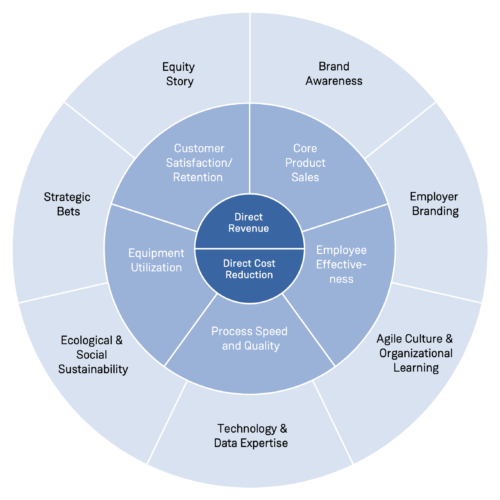
A new concept to map and design value creation from digital initiatives
Most, if not all established companies across all industries are currently busy developing digital products and services. However, questions regarding the actual value created with these endeavors become louder and the need for a “Return On Digital Investment” (RODI) becomes stronger.
While working with companies on their digital business models, we often experienced that these solutions are solely valued by their potential direct revenues or cost reductions. Nonetheless benefits often arise from the less tangible benefits that these digital solutions offer. Excubate’s Digital Value Canvas offers a simple framework to quantify both the direct and indirect value dimensions of digital solutions.
The framework was initially introduced in an article authored by Excubate founding partner Markus Anding. Now we will explore the individual dimensions in more detail and establish a structured approach for the assessment of digital products in the field. Over the course of three blog posts, we will cover the three rings of the Digital Value Canvas.
In this post we will address the Middle Ring: indirect commercial benefits. To read about the inner ring, please have a look at our first post.
The Middle Ring covers indirect commercial benefits
Digital products have effects on multiple elements of the value chain, from customer frontend (e.g. customer satisfaction and, thus, longer or more intense use of products) down to the internal delivery processes (e.g. higher equipment utilization and, thus, lower cost). While it is easy to make assumptions regarding additional product sales or longer customer retentions, measuring the real impact of digital products is much harder to accomplish.
The Middle Ring concerns itself with those value creation levers that are less tangible than direct commercial benefits but can mostly be translated into economic benefits comparatively easily (e.g. higher machine utilization drives down CAPEX and production cost).
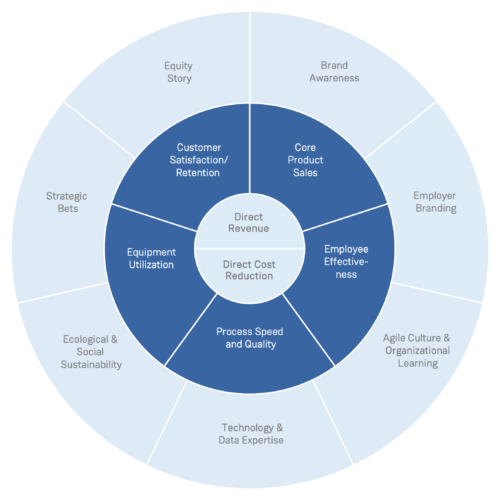
Core Product Sales: The basis for successful exploitation
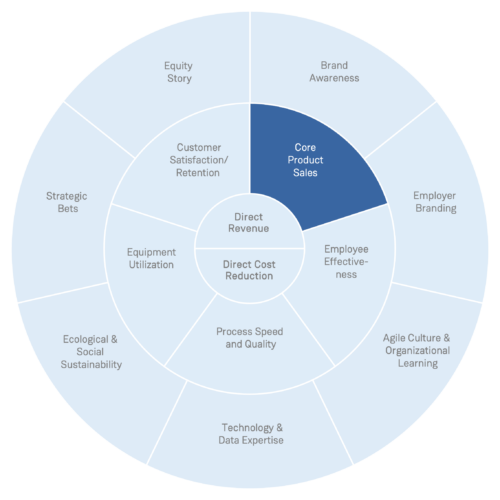
The first dimension we will address is the increase of Core Product Sales. By definition, core products are those products that are closest to a company’s core competencies and thus they are usually the main source of revenue. The core product already provides the user with a range of core benefits, which is why customers purchase it in the first place. However, digital products may add additional benefits or leverage existing ones, thus complementing the core product to a certain degree and thereby making it more attractive.
Hence, it becomes clear that, even though a digital product may not generate direct revenue, it can still indirectly earn its keep through the advancing of Core Product Sales. One example would be the introduction of a virtual assistant that helps the user to set up a very complex core product such as a CNC machine.
Fueling the most profitable initiatives
As aforementioned, core products are the backbone of any company. The regular income generated by core product finances almost every other function within the company. This makes them essential for the long-term viability of the organization, which in turn means much of the organization is focused on the exploitation of the core product. Conversely, it is the sale of core products that finances other products and also the exploration activities of the company.
A famous example of recent years was Amazon’s Dash Button solution. Customers could order a Dash Button for e.g. laundry detergents. When the product was used up, customers simply pressed the button which allowed Amazon’s software to automatically reorder the product. While the proprietary devices and APIs were only the enabler, the software in the background was the digital solution. The solution led to customers’ re-ordering the same product on a regular basis via Amazon, effectively cutting out the competition such as traditional supermarkets, completely.
How can you measure a digital product’s influence on core product sales?
While the influence of digital products on the core business can have countless forms, we would like to concentrate on two tangible cases in this article. Case number one is an increase in the amount of core products sold. This phenomenon was observed in various Excubate projects over the course of 2019.
A suitable example is an international machine manufacturer, that enhanced its core products by building a set of digital services around them. The services included real-time machine KPI tracking, automated spare part ordering, AR based remote assistance and a customer knowledge platform. In a number of interviews, our customer’s clients indicated, that the digital services were among the main selling points.
Since a single machine produced by our client was worth a minimum of seven figures, a single sale facilitated by the digital services had the potential to amortize the service’s development. Deconstructing core business sales to their exact root is a complicated task and not always possible. Regular interviews with customers (pre- and post-purchase) is a valuable source of information, as is the monitoring of user journeys. Furthermore, a close collaboration between sales and digital development is of great importance.
The second example case is an increase in core product price points, enabled through a shift in product quality. Digital solutions in a production environment are proven to positively influence product quality. An example is the replacement of measurement processes by AI-based software. In some industries the accuracy of produced goods (e.g. machine parts) determine the price on the market.
When superior quality leads to e.g. better certification, a manufacturing company can realize large benefits from new, digital production processes. This does not only occur in manufacturing, but also in industries like agriculture, where the produced product’s price is strongly dependent on its quality. To identify the value of a digital solution, that has a strong influence on production quality, the core product must be analyzed before and after the solution is implemented.
If the digital process has an influence on product quality and thereby on product price, the enabled price increase is an indicator for the solution’s value. A digital solution that enables no direct revenues at all can therefore nonetheless lead to strong financial benefits. The questions to be asked are therefore: Does the digital solution increase my core products quality? And can this increase be translated to better price points?
Identify now opportunities to leverage your core product sales!
A product portfolio is a lot like a more or less fragile ecosystem; You may never quite know how its inhabitants relate to each other. Thus, like in a real ecosystem, look for synergies between products and evaluate the potential to leverage them effectively to drive the performance of your core business. Can your digital product increase the quality of your core product or make it more beneficial to your customer?
Employee Effectiveness
Employee effectiveness is the employees’ ability to successfully complete their tasks and achieve the intended results and goals. It is located in the middle ring of the value canvas, due to its close relation to the core business.
What is employee effectiveness and how is it different from efficiency?
Effectiveness is not to be mistaken for efficiency. An example highlights the difference: Cutting the lawn in your garden with nail scissors is effective, since the job can be done very accurately. However, using a lawnmower is as effective, but way more efficient, since the job can be done in a much shorter period of time.
In other words, effectiveness is about doing the right things, while efficiency is about doing things right. Employee efficiency is thus the ratio of input resources (i.e. employee time) and output resources (e.g. tasks completed).
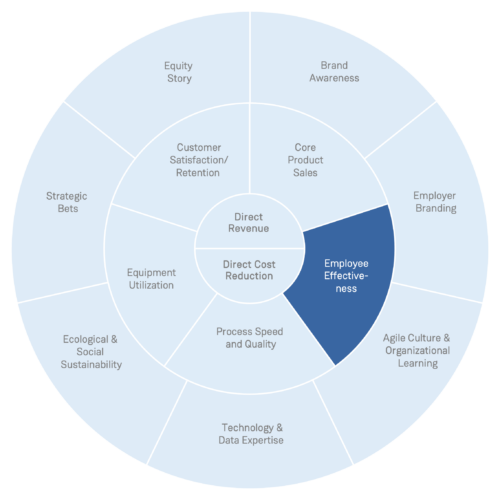
Let’s have a closer look at an example in a business context. A company introduces a new software that has a machine learning algorithm filter through a large data pool of past customer information. The algorithm looks for indicators that can predict the likelihood of a repeat purchase and provides the resulting list of most likely customers to the sales department. This, in turn, allows the sales rep to focus his attention on the most profitable customers in terms of repeatedly occurring business.
By enabling the sales rep to contact the “right” customers, she becomes more effective. Simultaneously, she becomes more efficient since sales targets (e.g. x sales per day) can be reached more easily, thus illustrating the close coherency of effectiveness and efficiency.
Our experience has shown that another good example for effectiveness-improving measures is the use of list-making applications such as Trello. These applications present tasks that need to be completed in a clear and structured manner and thus provide an overview over what needs to be achieved to complete a business objective. For example, such applications are useful for HR processes.
In the era of volatile markets, effectiveness becomes a critical competency
The current economic climate forces companies to focus on improving the effectiveness of their core value chain, in order to defend their competitive advantage. To realize this companies must first ensure to set the right goals and to enable their employees to achieve them step-by-step.
After getting the effectiveness right, companies can then focus on efficiency gains. There are many ways to leverage effectiveness (and various will be covered in the following posts). Nevertheless, one resource is predestined to be the starting point for all effectiveness-related endeavors, since even small changes can lead to major gains: employees.
Employee effectiveness can be directly translated into bottom-line impacts. For that reason, many digital initiatives aim at the improvement of employee effectiveness. These improvements may take time to materialize, especially in economies that are subject to legal regulations concerning employee protection (e.g. Germany) that prevent companies from e.g. firing employees. The example described above already provided a first glimpse on how these effectiveness improvements come together.
Furthermore, to leverage the greatest results, companies need to:
- Give the initiatives the right amount of time – Effectiveness does not come over night, employees will take a while to accept and understand changes in processes or new tools. A well thought-through change management and an understanding of the employees’ point of view (e.g. job-to-be-done) is essential.
- Changes need discipline – stick with the changes, even though they might increase the workload or decrease the effectiveness in the beginning. After a while these initial kick-off challenges will cease, and one can harvest the results.
- Ask the right questions – the digitalization of a bad process results in a bad digital process. Take your time to analyze your process landscape, understand your employees’ struggles and daily routines, understand where small changes (e.g. the utilization of a digital tool) can leverage the greatest benefits. And last but not least: see your employees as what they are: human beings and not just numbers on an Excel sheet. A great change that you believe in from a management point of view, might not at all seem desirable for your employees.
When these critical points are addressed with the necessary thought and time, digital solutions offer many ways to leverage employee effectiveness. They offer a solution to the challenges of the VUCA world by enabling employees to successfully achieve the respective company’s goals.
Connecting effectiveness with financial KPIs rationalizes digital initiatives
Measuring and quantifying the impact of digital products targeted at improving Employee Effectiveness, heavily depends on the nature of the employee’s tasks. If, for example, the tasks involve sales or fundraising, quantitative targets are usually provided by upper management and thus effectiveness can be measured quite easily. However, if the nature of the tasks is more qualitative (e.g. support staff) and therefore more subjective, it is more challenging to measure it.
Nonetheless, digital solutions have the potential to increase your company’s performance by curtailing activities that are not directly related to a business goal. The question is, however, how to best quantify these improvements. One relevant KPI is the average task completion rate. It revolves around the number of tasks that are completed within a given time frame and increases if more (relevant) tasks are completed successfully.
To return to the software example elaborated on earlier: The algorithm enables the sales rep to close more deals without necessarily spending more time on the phone, thus the task completion rate increases. Similarly, since the employee is working more effectively and thus completes more tasks, fewer employees are required. This materializes in the form of saved employee FTEs, which means the number of employees will level out in the medium- to long-run.
Conversely, since the capacity of each employee is enhanced, more tasks can be completed (keeping the number of employees constant). This implies that especially for growth-oriented organizations, effectiveness-enhancing initiatives present an attractive lever to increase overall capacity.
On a larger scale, one could also consider the overall revenue per employee that is generated. Although many aspects factor into this KPI, it is still valuable to see the relationship of revenue and the number of employees before and after the introduction of an effectiveness-improving initiative.
What does this mean for you?
No matter if you are in the service industry or the manufacturing sector: Your staff is the key to success. Thus, if there is a way to increase their effectiveness you should always opt for this solution as it will pay off in the mid- to long-term. Next time you evaluate a digital product, keep your employees in mind.
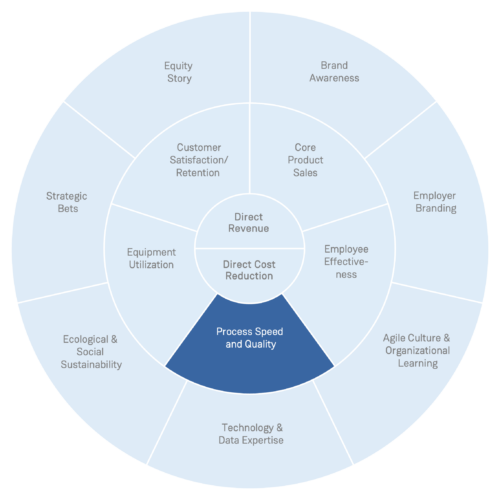
Process Speed and Quality
Digital products can support higher efficiency and output quality, e.g. by leveraging augmented reality technology for machinery servicing, Robotic Process Automation to automate finance processes or Tableau-based reporting tools that may deliver better insights for customers while simultaneously leveraging internal efficiencies.
What is a process?
A process is a bundle of different, recurring actions, organized step-by-step to achieve a specific result or goal. Companies can be seen as collections of different processes and relating resources and decisions. The quality and speed of a company’s processes largely determine its business success. Process quality can be defined in various ways. This article relates to it as the processes’ effectiveness; in other words, their ability to successfully lead to their intended end-result. Process speed is the amount of time, an effective process takes to be completed.
Process optimization has many forms and leads to great benefits
Value creation can be seen as a long sequence of different, often simultaneously occurring processes. The higher the degree of optimization in quality and speed, the better the value chain works. Especially in the current, difficult economic climate, most companies try to optimize their value chain, to reduce cost and expand profitability, thus try to optimize their processes. Digital solutions can play a major role in these optimizations, in all steps of the value chain. Two examples will lead to a better understanding.
A classical digital approach to optimize processes, is their automation. E.g. through RPA (robotic process automation) companies can digitize their process landscape. Formerly manual processes are replaced by automated and simple to install bots. The upside is clear. Bots can work 24 hours a day, seven days a week. They demand no salary, nor do they get sick or tired. But they also have no thinking of their own. Automated processes do their job as programmed. Carefully designed and bug free programs are of critical importance. Furthermore, Excubate has made some learnings, regarding RPA (and process digitalization) implementation, e.g.:
- A bad process digitized, results in a bad digital process. Before manual processes can be digitized, a detailed assessment is required. It is strongly recommended to optimize and simplify (as far as it doesn’t decrease the quality) “on paper”, before a successful bot should be developed.
- Which leads us to the second point: Do not digitize everything, just because you can. Take a step back and reevaluate value versus cost.
- After developing a digital / automated process landscape: keep track of your bots! RPA needs clear rules, accountabilities and responsibilities within your organization. Otherwise you end up with an unclear, constantly growing, uncontrollable bot portfolio. Losing control over your bots can result in expensive problems. And it may make your company vulnerable to attacks from the outside.
Another example shows, how digital solutions can optimize processes: AR remote assistance – which means offering technical remote support, enhanced by augmented reality. Since there are many areas of application, we’d like to focus on B2B manufacturing in this article. Main use cases here are machine repair, machine set ups, inspections and maintenance. Manufacturing remote assistance software offers special low bandwidth video call connections and AR interfaces, to actively support technicians and customers from afar. AR remote assistance optimizes the technical support process in globally acting companies dramatically.
Several business-related benefits can be realized through its implementation. E.g. the cuts in traveling and the ability to react in real-time to machine failures, increase technical support speed extremely. The experts’ and maintenance teams’ reaction times are strongly decreased, which furthermore leads to a serious decrease in time-to-solution. Especially in manufacturing, machine downtimes can become very expensive. The reduction of downtimes therefore leads to serious financial benefits at the same time. Furthermore, the ability to conduct root cause analysis from afar and then plan spare parts ordering much earlier than before, is an example for the increased process quality AR remote assistance may lead to: without traveling on site experts can now order the required spare parts immediately. This leads to a much higher first-time-repair-rate on site and replaces expensive on-site root cause analyses.
Two simple KPIs help you start measuring process speed and quality
Process speed and quality can be measured with different KPIs. In our experience two KPIs in particular give a good impression:
- Quality: % of successful process execution
All processes follow a specific goal, a successful execution is the completion of that goal without an interruption along the way, that leads to an uncompleted task chain. Put the rate of successfully completed processes before and after an implementation of a new digital tool in relation to each other. - Speed: Core Process completion time
It will be difficult to analyze the execution speed of a large process landscape. To start with it, instead focus on your core processes first (e.g. sales; production). Track the time e.g. on how long your average sales process takes – from initial lead to finalized sale. Identify where a digital solution can replace or did replace critical steps and estimate the saved cost.
Start today…
Are you aware on the different business potentials, digital solutions like AR remote assistance or RPA can offer your company? Use the Digital Value Canvas now to map the value drivers these technologies can offer. Hint: there are several!
Equipment Utilization
Efficiency gains through better employment of equipment
Next, we will cover Equipment Utilization. “Equipment” in this context includes all physical resources that are not human and thus not covered by Employee Effectiveness. This does not only include machines and tools, but also e.g. the very chairs that employees sit on or a plot of land.

“Utilization” addresses the time a piece of equipment is running productively, adding value to the organization. For example, a punching machine is considered to be running productively, whenever it is actively stamping sheet metal. For the purpose of this brief elaboration we will disregard time spent on producing faulty or substandard products, which will be discarded after production, and can thus not objectively be considered productive time.
Moreover, Equipment Utilization is not only applicable to the manufacturing sector, which heavily relies on machines, but also e.g. service sectors such as hotels, which aim at maximizing the time their rooms are generating value. This can be achieved through e.g. an algorithm that adapts the rates for rooms according to insights generated from weather reports, past data, or publicly available information.
The factor that is primarily considered when analyzing Equipment Utilization is availability. However, we would like to point out, that digital solutions potentially go beyond increasing the availability of equipment, by finding smart ways to e.g. manage the total available capacity in order to maximize value creation.
For illustrative purposes, consider a company that operates 3D printers to produce filigree replacement parts for their machines directly on the shop floor of their various manufacturing plants. This process can increase machine utilization, since spare parts can be printed directly on the shop floor when needed, reducing repair times dramatically.
A digital solution can be used to increase the printers’ utilization through the introduction of a company-wide digital marketplace for printer capacity. If one plant’s printer is accumulating more jobs than it can realistically service, an available printer at a nearby plant would be able to fill in and complete the additional jobs. This effectively increases the total time all printers are in use, thereby improving their utilization.
Scaling without additional capital expenditures
The scaling of operations always goes hand in hand with additional expenditures on property, buildings, plants, or technology. These capital expenditures are tied to assets and cannot be flexibly accessed. While this may not necessarily prove detrimental, it is still recommended to optimize Equipment Utilization since it reduces capital expenditures.
Although it is always beneficial to reduce capital expenditures, it is even more so when your organization intends to scale up its operation. By increasing total capacity without spending financial resources on new equipment (which would of course increase total capacity as well), capital expenditures can be kept low enabling further investments.
The factors that define Equipment Utilization
Equipment Utilization is mostly dependent on availability and capacity. The former is calculated by first subtracting planned downtime, such as maintenance or cleaning work, and breakdowns from the scheduled time of a piece of equipment. In the next step, this number is divided by the total scheduled time, thus resulting in a percentage. This percentage indicates the availability of the equipment, i.e. the time it can realistically be expected to add value.
However, this is merely the time the equipment is expected to add value which might not denote the actual value creation. It is conceivable that it is not running at full capacity at the moment. In order to calculate capacity, one must divide the total time the equipment is actually being used by the total available time. The result is a metric that indicates how heavily engaged the equipment is.
Let us return to the example given above, the 3D printer on a company’s shop floor. On an average day, production runs in three shifts each lasting eight hours or 480 minutes, thus resulting in a total scheduled time of 1,440 minutes. At the end of each shift, the 3D printers are scheduled to be cleaned, which takes roughly 20 minutes and adds up to 60 minutes per day.
Furthermore, the printers jam once a day, thus adding another 30 minutes of downtime. Subtracting these values from the total scheduled time leaves us with 1,350 minutes, divide this by 1,440 to arrive at an availability of 93.75%. However, as aforementioned, this does not necessarily mean that the printers are generating value 93.75% of the total time. Another factor to consider is the frequency and duration of printing jobs. On days where no spare parts are required, capacity would be running at 0%, while an overflow of printing jobs may result in the printers running at 100% capacity, with some printing jobs not being completed.
This overflow of printing jobs can then be flexibly re-allocated by a digital marketplace to printers with available capacity at a different nearby plant, thereby improving total capacity without the purchase of additional printers. As the example above shows, the organization was able to take on more printing jobs without necessarily increasing its overall capacity by purchasing more equipment. Instead, Equipment Utilization was optimized through a digital solution.
Keep your Equipment Utilization in mind
Start today by calculating your equipment’s utilization and think how much more value you could be creating with for example a digital capacity marketplace or another smart solution you may not even be aware of.
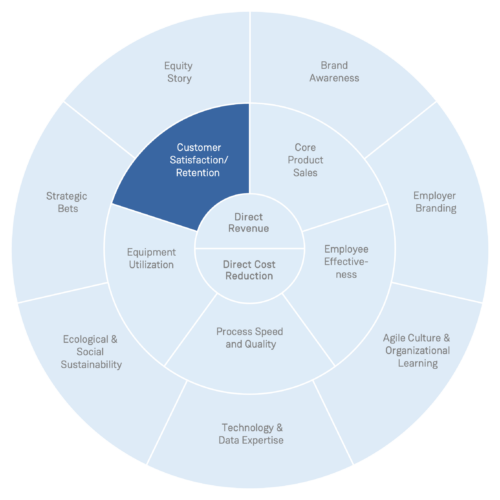
Customer Satisfaction & Retention
Why the customer is always right
A well-known proverb states that the customer is always right. It reveals an issue that is crucial to the success of any business: Do whatever it takes (within limits of course) to make your customers satisfied and retain them for as long as possible.
Customer Retention is the ability of an organization to maintain a customer for a specific period of time. For Service businesses this means, that customers stay on or renew their subscription or contract. For classical, product-based businesses, customer retention means that customers re-buy the respective products.
Essentially, Customer Satisfaction measures how often the customers’ expectations towards a product or service were met, or even exceeded. These expectations can be regarding quality, appearance, pricing, or, since the emergence and dissemination of e-commerce, consignment conditions such as shipping time.
Digital products potentially help improving both Customer Satisfaction and Customer Retention. For example, many websites nowadays offer its visitors the option to chat with a bot in case any questions arise. While bots cannot yet replace human interaction, they can nonetheless give quick answers to frequently asked questions, thus reducing the time visitors have to spend waiting for a solution to their query. Additionally, resources at responsible call centers are freed up since the queries can be resolved before they are even redirected to a call center employee. By quickly resolving the issue through a chat bot, the customer’s expectations of swift and effective service can be fulfilled.
Similarly, a company might employ an AI-based solution that assesses massive amounts of customer data to identify instances where customers were disappointed by a product or service to derive these customers’ current level of satisfaction. The system would then propose compensatory offers and incentives to these unsatisfied customers in order to reinstate a desirable level of satisfaction.
Customer satisfaction and retention do not only play a major role in B2C, but with growing competition, e.g. in machine manufacturing, more and more B2B players must focus their efforts on this topic. This is also one of various reasons, why most machine manufacturers are developing and launching a smart services portfolio to support their core business. These extending services consist of a large variety of useful digital solutions, e.g. real-time KPI tracking, automated alert systems to prevent machine downtimes, remote assistance software or document management systems. These solutions aim at increasing satisfaction, by supporting customers in enabling effectiveness and efficiency gains in their value chain. Furthermore, smart service portfolios serve as differentiators in the large, often substitutable offering of machines on the market, thus aim at improving customer retention.
The emerging necessity of Customer Satisfaction
Since arriving at the age of information, the general public is becoming more informed by the day, most likely even by the hour. This has important implications for any company intending to retain their customers. If, for example, one customer is particularly unhappy with a product or the service she received, she can voice these concerns to an increasingly large number of customers. Publishing a review can be done in a matter of minutes via a quick review on one of the many websites that supports a review function, such as Amazon.
Reaching a wide audience, the review can inhibit existing customers from re-purchasing this product or prevent potential customers from even considering it in their buying decision. The former results in high customer attrition, i.e. the loss of customers. The latter is accompanied by higher customer acquisition cost, i.e. the financial efforts that have to be undertaken in order to win new customers through e.g. a customer acquisition campaign.
Another factor that exacerbates this circumstance is the availability of easily accessible alternatives and substitutes for products and services. Customers are inclined to look for the best possible option, which is enabled through the availability of information such as reviews, and do not shy away from switching providers if they feel like they get a better deal elsewhere. In other words, customer loyalty is at an all-time low. Consequentially, the customer lifetime value is similarly low.
This means that not only is it harder and more expensive to gain new customers (i.e. high customer acquisition cost), but the existing customers become on average less profitable (i.e. low customer lifetime value). In conclusion, it becomes clear why Customer Satisfaction is more decisive today than it was before. Still, the age of information is a coin with two sides. While it introduces new challenges and problems, it also presents appropriate solutions to those in the form of digital products and services.
A measurement for your customers’ happiness
Especially in a B2C-context, unhappy customers find the need to voice their opinion through crowd-sourced review platforms. As such, they produce a good indication of how customers feel about a product or service, a lot of high-rating reviews implying customers are very satisfied with how the product performs compared to their expectations. Conversely, many low-rating reviews indicate that at least one metric along which the product is most commonly measured, does not perform very well and thus customers are left disappointed.
Here, one can compare the average rating before and after the introduction of the digital solution. If it contributed to Customer Satisfaction, there will be a statistically significant change in the ratings once all other factors that might have influenced the change have been accounted for. However, these customer product ratings always have to be analyzed with caution. Only customers who have an extreme opinion about a product (i.e. very positive/negative), write a review about it. The moderate middle segment tends to remain lamentable underrepresented.
Therefore, the Net Promoter Score (NPS) is a much more representative metric in order to determine Customer Satisfaction. It simply involves asking customers on a scale from zero to ten how likely they are to recommend the product/service to a friend/colleague. Customers are then segmented into three groups: Promoters (score 9-10), Passives (score 7-8), and Detractors (0-6).
The NPS is subsequently calculated by subtracting the percentage of Detractors from the percentage of Promoters. Since word of mouth advertisement is to date the most effective means of advertisement, having a high NPS is fundamental to growing sales and evaluating Customer Satisfaction. Again, one compares the NPS before and after the introduction of a digital solution in order to evaluate the impact it had.
In a B2B-context, however, it is often less feasible to determine a product’s NPS since the number of customers tends to be smaller than in a B2C-context. Instead, the size of the sale is significantly higher. Therefore, a better metric to determine Customer Satisfaction/Retention is monthly recurring revenue (MRR). It is the sum of all revenue streams that are likely to be generated on a continuous basis for a specific period of time.
Here, one would consider the trend that can be observed over a prolonged period of time. If the MRR is decreasing, it is very likely that Customer Retention is low, while it is probable that it is stable if the MRR is moving sideways. Accordingly, a positive trend of the MRR can imply that customers’ expectations are met and that they are very satisfied with the product/service they are receiving.
What are you doing to keep your customers?
In the end, Customer Satisfaction is often a very welcomed side-effect of digital solutions. Nonetheless, Customer Satisfaction and its enhancement can also be the very focal point of a digital product. In any case, keeping your customers for as long as possible is fundamental to a smoothly running business; regardless of the industry its in.



